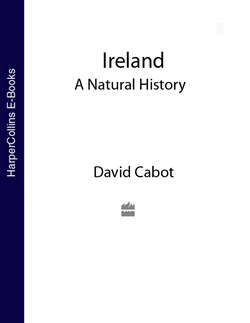Читать книгу Collins New Naturalist Library - David Cabot - Страница 8
ОглавлениеList of Plates
Plate 1
Remains of a sixth century monastery, including a later twelfth century round tower, Devenish Island, Lower Lough Erne, Co. Fermanagh
Crucifixion slab, early Christian hermitage, Duvillaun More, Co. Mayo
Mweelrea Mountain with Killary Harbour and Maumturk Mountains in the distance
Red deer stag and hind
Plate 2
Part of the northeast facing cliffs, Benbulbin mountain range, Co. Sligo
Lowland blanket bog with characteristic surface pools. Glenamoy, Co. Mayo
Bank of hand cut blanket bog, Co. Galway
Irish heath in April. Bellacragher Bay, Co. Mayo
Plate 3
Colony of naturalised pitcher plants on Derrychashel raised bog, Co. Westmeath
The River Suck below Ballinasloe before joining the River Shannon
Lough Neagh, the largest lake in Ireland. A view to the southwest, overlooking Toome and the eel traps
The otter is more widespread and abundant in Ireland than in any other European country
Plate 4
A Connemara river in flood, acidic in nature, rich in oxygen, and conduit for sea trout from the nearby sea to freshwater lakes
Mullagh More with slumped beds of carboniferous limestone. The tree in the foreground would hardly support a hanging man
Spring gentians, one of the glories of the Burren, Co. Clare
Rahasane Turlough, Co. Galway, one of Ireland’s most celebrated wintering wildfowl wetlands
Plate 5
Glen Inchiquin, Co. Kerry, with Lough Inchiquin and Uragh Wood in the distance
Willow and alder carr woodland, near Newport, Co. Mayo
Uragh Wood. Co. Kerry – an ancient sessile oak woodland
Silver birch woodland, Killadangan, near Westport, Co. Mayo
Plate 6
Abandoned farmland in west Mayo. The ‘fossilised’ lazy beds or old potato ridges testify to the former importance of these lands
Greenland white-fronted geese, formerly confined to raised and blanket boglands but now found principally on improved grasslands as here on the North Slob, Co. Wexford, their most important habitat in Ireland
A mosaic of farmland with intact hedgerow systems, Co. Fermanagh
Ballydavid Head, Co. Kerry, with Smerwick Harbour in the distance. One of the wildest stretches of coastline where the Atlantic waves have eaten back the rocks to create dramatic cliff scenery. A favoured habitat of the chough
Plate 7
Inner Galway Bay where long sea inlets penetrate the land providing excellent conditions for the cultivation of oysters
Cliffs of Moher, Co. Clare, where the horizontally bedded sandstone cliffs provide breeding sites for an abundance of seabirds
Banna Strand, Co. Kerry, with the Dingle peninsula in the distance. One of the many fine beaches and associated sand dune systems found along the Irish coastline
Great Blasket island, Co. Kerry. Occupied until 1952, the island is now an important haul-out area for Atlantic grey seals
Plate 8
Increasing numbers of barnacle geese are wintering in northwestern and western coastal areas
Tory Island, Co. Donegal, one of the remotest and bleakest of inhabited islands of Ireland. It is an important observation point for migratory seabirds
The gannet is the largest seabird in Ireland, and numbered some 24,700 breeding pairs in five colonies during 1984–8
The power of the Atlantic is slowly sculpting and forming new coastal landscapes along the western seaboard
